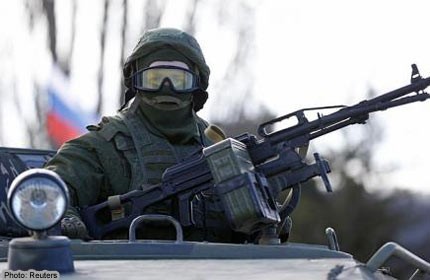Russian troops will stay put: Kremlin

RUSSIA showed no intention of moving its troops out of Ukraine's strategically important Crimea peninsula, despite world leaders issuing their strongest condemnation and threatening sanctions.
Moscow also hit back at Washington for making what it called "unacceptable" threats.
The tensions roiled global markets, sending shares from Tokyo to New York tumbling on Monday.
The Group of 7 (G-7) developed nations denounced Russia for its "clear violation of the sovereignty and territorial integrity of Ukraine" and announced their boycott of the G-8 summit that Russia was to host in Sochi "until the environment comes back where the G-8 is able to have a meaningful discussion", a statement said. The seven are France, Germany, Italy, Japan, Britain, the United States and Canada.
US Secretary of State John Kerry on Sunday went so far as to suggest booting Russia out of the G-8.
European Union leaders were to meet on Monday to discuss the EU response, while the Organisation for Security and Cooperation in Europe has sent observers to Crimea. The United Nations is less able to act in this crisis as Russia sits on the Security Council and holds veto power.
Ukraine's interim leader Arseny Yatsenyuk called Russia's act a declaration of war, while the US worked to protect its global credibility against a Russian president prepared to risk the worst confrontation with the West since the end of the Cold War.
As Russia scrambled fighter planes and moved armoured columns, Mr Kerry was due in Kiev today for talks with Mr Yatsenyuk, who heads the Western-backed government that took power after unpopular President Viktor Yanukovych fled on Feb 21.
While stocks plunged, energy prices shot up.
Although no shots have been fired in the crisis thus far, investors are worried because a quarter of Europe's gas passes through Ukraine. Any disruption could wreak havoc on economies struggling to return to growth after three years of misery and hurt global economic expansion.
Stock prices for Russian gas monopoly Gazprom fell by some 13 per cent on Monday.
But Russian President Vladimir Putin has remained unmoved by the threat of economic sanctions, even as his central bank was forced to raise interest rates by as much as 1.5 percentage points to protect the battered rouble.
Analysts say Mr Putin is calculating that he has enough cards to play against US President Barack Obama, who needs his help on a variety of global issues, ranging from supplying the soon-to-depart US troops in Afghanistan, to curbing Iran's nuclear ambitions and ending the civil war in Syria.
Should Mr Obama be unable to to press back, they reckon, US influence on an increasingly assertive China may be called into question.
"I am sure China is paying close attention to what's unfolding in Ukraine and how the diplomatic game is playing out, taking note of the initial successes of Putin's hard line," said Professor Steve Tsang, director of the China Policy Institute at the University of Nottingham.
"But it is early days to draw conclusions, and it is easy to draw the wrong one."
jeremyau@sph.com.sg

Get a copy of The Straits Times or go to straitstimes.com for more stories.